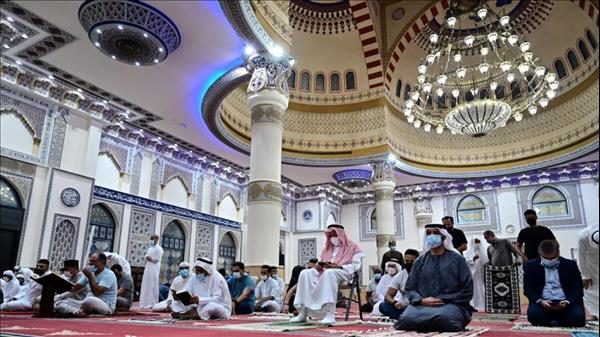
Ramadan 2022 in UAE: 5 ways the holy month is different from the last two years
Published: Sat 2 Apr 2022, 10:37 AM
Last updated: Sat 2 Apr 2022, 10:58 AM
Ramadan this year would be the third socially distanced holy month to be marked across the world. In the UAE, multiple Covid safety rules have been eased and Ramadan 2022 would be the most 'normal' in three years.
Irrespective of the safety rules that were in place during Ramadan, one thing was constant: The spirituality that the holy month offered. The #StayHome Ramadan of 2020 offered residents the chance to bond with their families as they offered their evening Taraweeh prayers together, while last year, the faithful flocked to mosques for socially distanced congregational prayers.
In this special report, we analyse how the UAE has adopted the new normal and how that will shape the holy month of Ramadan this year:
1. Mosques, Taraweeh and Tahajjud prayersIn the Ramadan of 2020, mosques remained closed as a Covid safety measure, and residents offered their special prayers at home. Taraweeh prayers were streamed live from the Sheikh Zayed Grand Mosque on official television channels and radio stations throughout the holy month of Ramadan.
Last year, Taraweeh prayers resumed with strict Covid safety rules in place.
This year, the rules have been eased further:
> Canned water may be distributed among worshippers in mosques.
> Social distancing between worshippers has been shortened to one metre.
> Copies of the Quran may be stocked at mosques, provided they are sterilised after each use.
> Women's prayer halls will remain open during Taraweeh.
2. Daily Covid cases, deathsThe UAE has been seeing a sharp drop in the number of daily Covid cases. They have stabilised around the 300-mark, with no deaths reported in weeks.
This was not the case in the lead up to the holy month over the last two years. Have a look:
3. How Covid symptoms differRecovery rates from Covid-19 are far higher in 2022 as compared to 2021 and 2020. Even the symptoms of those who contract the virus differ.
In the last two years, hospitalisation rates were high as complications caused by the virus were severe.
Dr Mukesh Kumar Shewak Ram, internal medicine specialist, said that the Covid-19 patients had severe symptoms 2020 as compared to the present wave.“Symptoms in initial waves of Covid-19 and now, is different in sense that, there is no loss of taste and smell. Sweating is new symptom for omicron variant,” said Dr Kumar.
He also pointed out that they have not recorded severe symptoms due to mass vaccination of the residents.“Omicron has infected more people as it is more infectious. Symptoms are very mild for people who are vaccinated with the booster dose,” added Dr Kumar.
Dr Srinivas Rao, internal medicine specialist, NMC Speciality Hospital, Al Nahda, Dubai, said that the earlier spectrum of illness associated with Covid-19 was wide, ranging from asymptomatic infection to life-threatening respiratory failure.
“Most symptomatic infections were mild, prolonged, accounting for 80-85% of infected patients, with cough, myalgias, and headache were the most commonly reported symptoms,”
Post the vaccination against Covid-19, Dr Rao said:“Data suggest that Covid-19 caused by the new variants (Omicron ) is less severe and milder than infection caused by prior variants,”
Dr Rao also added that illness due to the Omicron may be milder, mimicking common flu , vaccinated people are recovering very fast without need of hospitalization.
4. Covid safety rulesMask and social distancing have been eased as compared to last two Ramadan and residents are quite looking forward to it. They say that after a gap of almost two years, they will be starting a stress-free devotion.
After the UAE on Friday announced that the holy month would begin on April 2 , many flocked to mosques to offer the first Taraweeh prayers.
“It will be quite different this year as compared to last two years. The first Ramadan during the pandemic, we did go to masjids to offer prayer. As the situation improved during the previous Ramadhan, we were quite happy to have worshipped in masjids,” said Zaheer, a sales executive and a resident of Sharjah.
He is also expecting more people to come to masjids for prayers during Ramadan 2022.
Dubai resident Saamid said that easing of Covid-19 protocols will allow worshippers to spend time in masjids, either to offer prayer or to recite the Quran.“The holy book, Quran, was removed from the shelves because of Covid-19 protocols during the last two Ramadan. THe coming holy month will have the devotion buzz in the masjids,” Samid said.
He added:“Worshippers will follow all the rules laid by the authorities as we all are quite happy to be expecting the holy month nearly pre-Covid times.'
5. Iftar tentsA common sight during the holy month, the communal tents were banned over the last two years as a Covid safety measure.
The tents will make a comeback this year, with authorities specifying the Covid safety rules that must be followed. Worshippers must maintain a distance of at least one metre from one another. To prevent crowding, entry will be staggered, with the tents receiving fasting Muslims up to two hours before Iftar.
ALSO READ:
- UAE: Sheikh Zayed Grand Mosque announces Ramadan timings
- Ramadan 2022 in UAE: Faithful share a nearly pre-pandemic vibe for the holy month
A government spokesperson on Wednesday said that all Covid safety protocols will be subject to“continuous supervision and monitoring” during the first week of Ramadan. They would be modified or updated as required.

Legal Disclaimer:
MENAFN provides the
information “as is” without warranty of any kind. We do not accept
any responsibility or liability for the accuracy, content, images,
videos, licenses, completeness, legality, or reliability of the information
contained in this article. If you have any complaints or copyright
issues related to this article, kindly contact the provider above.

















Comments
No comment